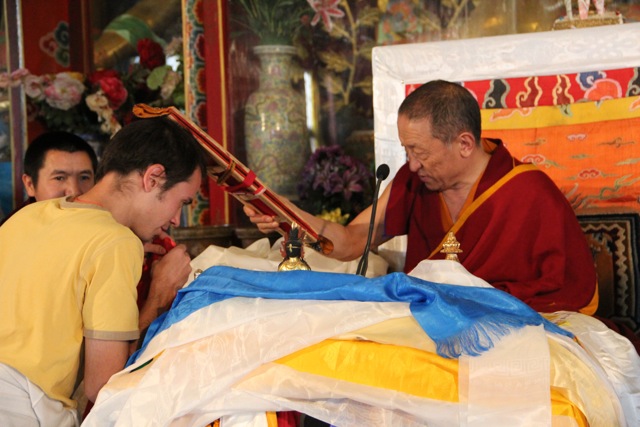Buddha-Nature and Pure Perception
Many of us these days study the Uttaratantra with Khenpo Urgyen Tenpel. As everyone probably knows, this text explains Buddha-nature. It seems very important to study this topic in order to understand what pure perception means – the concept crucial for the Vajrayana Buddhism.
We often hear that Vajrayana view is seeing everyone and everything as pure and perfect – ourselves, other beings, our environment. It might be very challenging however to try to apply it. For example, imagine we are in a position of a boss and our employees have not done their work properly. Should we say: “Thank you guys, well done?” Similar things happen in personal relationships as well. For instance, our partner, relative or friend tends to behave in a way that drives us crazy.
Incorrect understanding of pure perception may easily drive us into very immature way of behavior: instead of telling another person that we feel uncomfortable with certain things, we just throw him or her to garbage. This is because we think that we must practice pure perception and therefore should not express that something goes wrong. Or we think that everything must be perfect, and if it is not the case with something, we ignore it.
One more example. Sometimes we might think that since everything is a pure realm, we should forget that we are in samsara and just be happy. However, until we actually did not get rid of samsara, we will again and again face with the uncontrollably recurring problems and sufferings. As Dr. Alex Berzin explains, samsara does not mean only wandering in the 6 realms of beings. It also means that everything in our lives goes up and down – our mood, level of discipline that we are able to maintain, our interest in our Dharma study and practice, our health, our relationships with every person and so on – just everything. So we need to be prepared to all these problems and going down phases. Otherwise, we will be easily discouraged and upset when things will go wrong again – and again, and again. And, of course, we should never abandon our perseverance and effort, despite the notion that everything is perfect from the beginningless time.
As a Russian musician and poet Konstantin Kinchev wrote: “The pure heart is not obtained by a mere coincidence. The clear realm is conquered through the effort to live.”
So Uttaratantra explains that although our Buddha-nature is pure and perfect, at our current state it is defiled by the adventitious stains. I find very clear the explanation of this issue by Dr. John Makransky in his 'Awakening through Love'. He says that pure perception means that we acknowledge our own and everybody else’ basic goodness and go beyond our own limiting ideas about ourselves and others.
However, it does not mean that we suppress our thoughts and emotions towards others or ignore their thoughts and emotions towards us.
Moreover, our Buddhist teachers actually confront our shortcomings in order to guide us on the path while seeing our pure and perfect Buddha-nature. I would say that it is quite an interesting experience – to be able to communicate with the gurus – with those who directly see and commune with our pure nature beyond what we might think about ourselves, and who will never abandon us no matter what. Probably one of the most important reasons why I joined the Shedra is to be with these extraordinary beings.
~Evgeny from Russia




Comments
Vajrayana Buddhism teach us about knowledge on our experience, our incarnation, our bodies, and that very knowledge is related to universe itself, or the atom of the center of Universe too.